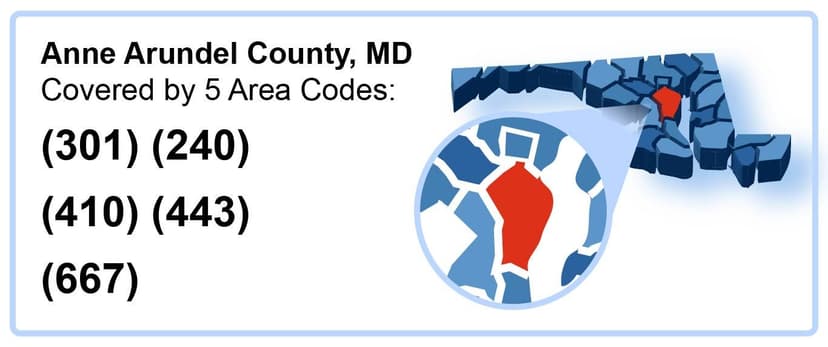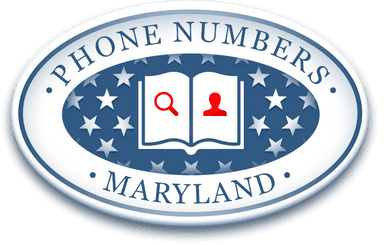What are Anne Arundel County Area Codes?

The introduction of the North American Numbering Plan (NANP) resulted in the creation of Numbering Plan Areas (NPAs), with numbering plan area codes assigned to them. Since the introduction of NPAs, phone numbers use area codes to represent where they are registered, making it easy to identify the origins of phone calls. Area codes in Maryland are under the Maryland Public Service Commission (PSC)’s management, as delegated by the Federal Communications Commission (FCC).
The five area codes currently active in Anne Arundel County are:
Area Code 301
Area code 301 is part of the original 86 area codes introduced in the country in 1947. It formerly served the whole of Maryland. Currently, only a small section of Anne Arundel County is under the jurisdiction of the 301 NPA. Anne Arundel County neighborhoods served by this area code include Maryland City and the outskirts of Lauren.
Area Code 240
Area code 240 is a Maryland telephone overlay code activated in 1997 as an overlay on the 301 NPA. It covers the same communities.
Area code 410
The Maryland PSC introduced area code 410 in 1991 as a split from the 301 NPA. It is a telephone area code covering Anne Arundel County alongside other surrounding counties. Anne Arundel County communities under this area code’s coverage include Annapolis, Glen Burnie, Severn, Severna Park, Odenton, Highland Beach, and Crofton.
Area Code 443
Area code 443 is a Maryland telephone overlay code introduced in 1997 as an overlay on the 410 NPA.
Area Code 667
Introduced in 2012, area code 667 is a Maryland telephone overlay code. It is an overlay on the 410 and 443 NPAs.
What are the Best Cell Phone Plans in Anne Arundel County?
Cell coverage in Maryland is excellent, with all four major network operators providing wireless coverage in over 90% of Maryland’s territory. AT&T has the broadest reach, covering 98% of Maryland, while T-Mobile’s 94% coverage takes the second position. Verizon and Sprint both cover about 91% of Maryland.
Ironically, the excellent cell coverage in Maryland does not translate to overwhelming wireless penetration. Data from a 2018 CDC survey indicated that about 39.4% of Maryland adults resided in wireless-only households. The data showed a slight improvement in exclusive wireless subscriptions among minors in the state. About 49.1% of Maryland children lived in wireless-only homes. However, households that exclusively used landlines only accounted for 0.8% of the state’s minor demographic.
Voice over Internet Protocol (VoIP) adds to the competition in the telephony services sector. VoIP routes phone calls over broadband internet and offers various bundled services to subscribers. An FCC report confirmed VoIP’s growing popularity by observing that the number of active VoIP subscriptions in the country has surpassed traditional landlines.
What are Anne Arundel County Phone Scams?
Scammers deploy phone calls and text messages to pass misleading information and defraud Anne Arundel County residents. To educate Marylanders on con artists’ devious schemes, the Consumer Protection Division of the Maryland Attorney General’s Office issued a Consumer Guide for Marylanders. The guide contains information on the prevalent phone scams in the state and provides tips on how to avoid and report them. Popular phone scams identified by this guide include:
What are Bank Investigation Scams?
Scammers call unsuspecting residents and introduce themselves as bank examiners and law enforcement officers. The fraudsters seek the help of unsuspecting residents in concluding phony investigations. The assignments given to the marks involve going to banks to withdraw money from bank workers allegedly under investigation. After withdrawals, they unknowingly hand over the cash to the assumed bank examiners, hoping to get a refund after the investigation. However, victims do not get a refund nor do they see the fake bank examiners again. Do not accept an invitation to be part of a bank investigation without verifying the credentials of the caller. Report bank investigation scams to the Consumer Protection Division at (410) 528-8662 or file an online complaint.
What are Advance-Fee Loans Scams?
These scams target Anne Arundel County residents with low credit ratings. Scammers call those that fall into this category and promise guaranteed loans their poor credit histories disqualifies them from getting. Hopes of incoming funds convince victims to pay the fees demanded by the fraudsters upfront. After making payments, victims will no longer be able to reach the scammers. Use reverse phone lookup on unknown numbers to get the true identities of the people on the other line offering loans and avoid becoming victims. Report advance-fee loans to the Consumer Protection Division by completing its online complaint form.
What are International Lottery Scams?
Anne Arundel County residents get phone calls from scammers claiming to be lottery officials in foreign countries. They notify residents they have won in the foreign lotteries but must pay token fees before redeeming their prizes. There is no lottery to be won. Victims lose any fees paid upfront to claim the fake winning. Conduct a phone number search to get information on the caller and avoid this scam. Call (410) 528-8662 to report lottery scams to the Consumer Protection Division.
What are Phishing Scams?
Phishing scams deceive residents into believing they are communicating with genuine government agencies and financial institutions. Scammers use the authority of the impersonated institutions to seek personal information from unsuspecting residents. Phone calls, text messages, and emails, allegedly from government agencies or financial institutions, are used in these scams. The messages contain links the targets are to use to update their records, but these links lead to cloned websites.
Scammers use these fake websites to harvest the personal information of victims. Personal records stolen in this way are used to commit identity thefts or sold to other fraudsters. Do not share your personal information with any individual or institution over unsolicited phone calls or emails. Initiate direct contact with the agency in question to confirm the authenticity of a phone call. Victims of phishing scams should use the online consumer complaint form to report them to the Consumer Protection Division.
What are Charity Scams?
Scammers set up bogus charity organizations and solicit funds on the fake charities’ behalf. They exploit the goodwill of residents and divert donations to their accounts. Authorities warn Anne Arundel County residents to ask questions before making donations. Persons soliciting on behalf of charity organizations must provide information on deductible taxes, the percentage going to the charities’ missions, and evidence of previous charity works. Alternatively, Marylanders can use the charity database managed by the Maryland Secretary of State to confirm any charity’s authenticity before making donations. Report charity scams to the Consumer Protection Division by dialing (410) 528-8662 or completing an online consumer complaint form.
To unmask fraudsters calling with unknown numbers, run reverse phone number searches on these unfamiliar phone numbers. Reverse phone lookup answers the “who is this number registered to?” question and makes it easier to spot any misrepresentation.
What are Robocalls and Spam Calls?
Robocalls are random phone calls placed by automated machines used to deliver pre-recorded messages to residents. Robocalls are legitimate telemarketing tools that have now been abused by scammers and spammers. In recent times, the number of robocalls received by Anne Arundel County residents has soared. Scammers also contribute to robocalls abuse by deploying them to commit phone scams.
To combat robocall menace in the state, Maryland’s Attorney General, alongside other Attorney Generals across the nation, agreed on some principles with telephone carriers. At the top of the recommendations was for the network operators to upgrade caller authentication and offer affordable call blocking services to subscribers. Phone manufacturers developed call filtering and call blocking features that notify subscribers of suspected spam calls. These notification allows subscribers to ignore such calls and block the numbers used to make the spam calls.
To reduce robocalls frequency, take these steps:
- Ignore calls from unknown numbers. Allow the calls to divert to your voicemail and screen missed calls for suspected spam calls.
- Guard your voicemail against hacking by setting up a voicemail password.
- Hang up calls that turn out to be robocalls without following prompts provided during those calls. Pushing buttons as instructed only attracts more robocalls.
- Do not fill your phone numbers on forms circulated by businesses, except it is vital. When you do, strictly warn them not to share your information with other companies.
- Place your number on the National Do Not Call Registry by completing an online form or dialing 1 (888) 382-1222 from the number you wish to place on the register.
- Subscribe to a convenient call blocking service offered by your network operator.
- Download third-party call blocking apps and use them if your telephone carrier does not provide such service.
- Report robocalls abuse by using the FTC’s online complaint assistant.
How to Spot and Report Anne Arundel County Phone Scams?
The FTC released some guidelines that help Anne Arundel County residents easily spot and avoid phone scams. The instructions advised residents to be cautious of phone calls that involve:
- Information on prizes won accompanied by requests to make some payments upfront before being eligible to redeem those prizes. Free gifts or prizes won should not cost you anything.
- Calls purportedly from government agencies or utility companies that threaten arrests over unpaid bills, taxes, and tickets. These institutions do not reach out to defaulters over phone calls.
- Business offers that require immediate funding to prevent the opportunities from slipping away. Take your time and carefully consider an offer before financing it.
- Emphasis on unconventional payment methods like preloaded debit cards, gift cards, and wire transfers. Funds sent through these means are hard to trace or recover.
- Unsolicited calls from government agencies seeking personal information are usually scams. Do not share confidential details over unsolicited phone calls.
Different government agencies provide resources and guidelines that help residents avoid phone scams. Anne Arundel County residents get periodic scam alerts and platforms to report phone scam incidents from these agencies:
Anne Arundel Sheriff’s Office issued an alert on a prevalent phone scam. Report other phone scams to the Sheriff’s Office by calling (410) 222-8610.
The Maryland Attorney General’s Office has a Consumer Protection Division that issued a comprehensive Consumer Guide for Marylanders. The guide identified common scams and proffered ways of avoiding them. Victims of phone scams should dial (410) 528-8662 or file an online complaint to report phone scams to the division.
Maryland’s Secretary of State manages a database that helps residents authenticate charities’ registration status. Suspicious charity organizations can be reported online to the Secretary of State’s Office for further investigations.
The Federal Communications Commission (FCC) regulates the telecommunications industry. The FCC provides guidelines on how to identify spoofing and activate call blocking to help residents avoid scams. The FCC recently mandated network operators to improve caller authentication. Report spoofing and other phone scams to the FCC by filing an online complaint. The Federal Trade Commission (FTC) protects consumer interests. Their instructions help residents identify common phone scams and avoid robocalls. The FTC manages the National Do Not Call Registry, which directs telemarketers not to robocall you. Report phone scam incidents to the FTC by using the online consumer complaint assistant.
